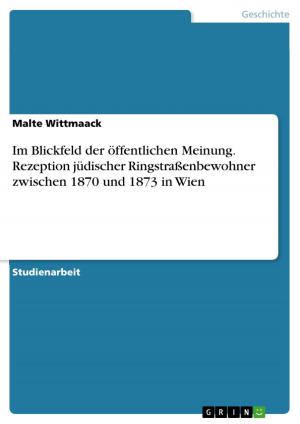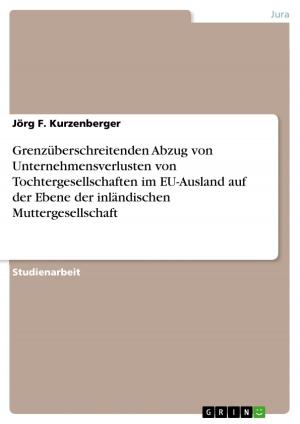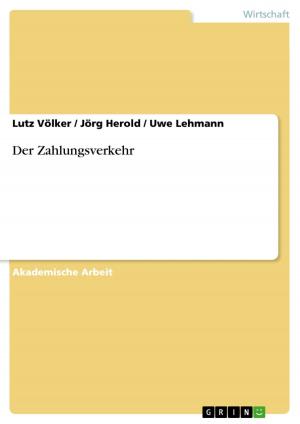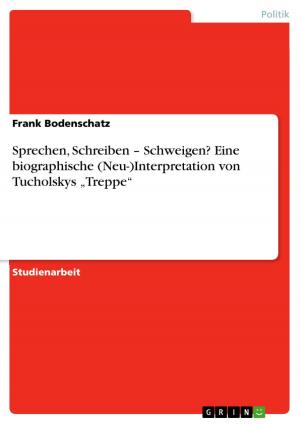| Author: | Berenice Walther | ISBN: | 9783638014410 |
| Publisher: | GRIN Verlag | Publication: | February 29, 2008 |
| Imprint: | GRIN Verlag | Language: | English |
| Author: | Berenice Walther |
| ISBN: | 9783638014410 |
| Publisher: | GRIN Verlag |
| Publication: | February 29, 2008 |
| Imprint: | GRIN Verlag |
| Language: | English |
Seminar paper from the year 2007 in the subject American Studies - Literature, grade: 1,3, University of Münster, course: Teaching Short Stories in the EFL-Classroom, 19 entries in the bibliography, language: English, abstract: The short story has its origins in traditional oral storytelling. Many of the world's greatest literary classics such as El Cid, La Chanson de Roland, Beowulf or the Odyssey were originally orally transmitted. In most cases, the story has undergone many modifications in the course of the telling processes; still they are today's primary testimonies for language, history, culture and people of the past. They were told in rhyming and therefore functioned as a mnemonic device for easier recall . In Europe, the short story began to evolve from oral storytelling in the early 14th century with Chaucer's Canterbury Tales and Boccacio's Decamerone, books consisting of individual short stories within a larger frame story. Only in the 19th century, modern short stories began to be considered a proper genre. Print magazines represented a strong market for short fiction, theories related to this began to surge, as for example, Edgar Allan Poe's The Philosophy of Composition. Nowadays, the number of commercial magazines publishing short stories has decreased but they appear to have found their place in online publications. Today, reading has become a minor activity in people's lives with globalisation, technological progress and a fast-growing media industry. In schools, pupil's interest is increasingly difficult to stimulate , especially when it comes to literature in the English Second Language classroom. Students are used to fast information input without necessarily having to become active themselves, they lose concentration easily when the learning process takes too long or they lose patience when they do not understand right away. The use of short stories in the English Foreign Language classroom is one possibility to respond to this problem teachers of foreign languages have to face. Therefore, this paper is going to define the genre of the short story as such to create a basis for the following presentation of the benefits of short stories for the North Rhine-Westphalian English Language Classroom. In the next step, the curricula and guidelines are taken into consideration in order to develop some ideas on how to implement The Machine that Won the War by Isaac Asimov in class. These will be integrated into a lesson plan with several activities around the story. There are several theoretical works dealing with the lecture of short stories, starting with Poe's work mentioned above, Allen Walter's The Short Story in English, Charles E. May's The Short Story - The Reality Artifice or Frank Myszor's The Modern Short Story. Some articles have been written e.g., by Rüdiger Ahrens Die bisherige Rolle der Short Story im Englischunterricht der Sekundarstufe II, dealing with the use of short stories as a way of teaching literature. Most has certainly been written about didactics of English in German classrooms such as Wolfgang Gehring's Englische Fachdidaktik Eine Einführung, Englisch lernen und lehren, Didaktik des Englischunterrichts by Johannes - P. Timm or Egon Werlich's Praktische Methodik des Fremsprachenunterrichts mit authentischen Texten.
Seminar paper from the year 2007 in the subject American Studies - Literature, grade: 1,3, University of Münster, course: Teaching Short Stories in the EFL-Classroom, 19 entries in the bibliography, language: English, abstract: The short story has its origins in traditional oral storytelling. Many of the world's greatest literary classics such as El Cid, La Chanson de Roland, Beowulf or the Odyssey were originally orally transmitted. In most cases, the story has undergone many modifications in the course of the telling processes; still they are today's primary testimonies for language, history, culture and people of the past. They were told in rhyming and therefore functioned as a mnemonic device for easier recall . In Europe, the short story began to evolve from oral storytelling in the early 14th century with Chaucer's Canterbury Tales and Boccacio's Decamerone, books consisting of individual short stories within a larger frame story. Only in the 19th century, modern short stories began to be considered a proper genre. Print magazines represented a strong market for short fiction, theories related to this began to surge, as for example, Edgar Allan Poe's The Philosophy of Composition. Nowadays, the number of commercial magazines publishing short stories has decreased but they appear to have found their place in online publications. Today, reading has become a minor activity in people's lives with globalisation, technological progress and a fast-growing media industry. In schools, pupil's interest is increasingly difficult to stimulate , especially when it comes to literature in the English Second Language classroom. Students are used to fast information input without necessarily having to become active themselves, they lose concentration easily when the learning process takes too long or they lose patience when they do not understand right away. The use of short stories in the English Foreign Language classroom is one possibility to respond to this problem teachers of foreign languages have to face. Therefore, this paper is going to define the genre of the short story as such to create a basis for the following presentation of the benefits of short stories for the North Rhine-Westphalian English Language Classroom. In the next step, the curricula and guidelines are taken into consideration in order to develop some ideas on how to implement The Machine that Won the War by Isaac Asimov in class. These will be integrated into a lesson plan with several activities around the story. There are several theoretical works dealing with the lecture of short stories, starting with Poe's work mentioned above, Allen Walter's The Short Story in English, Charles E. May's The Short Story - The Reality Artifice or Frank Myszor's The Modern Short Story. Some articles have been written e.g., by Rüdiger Ahrens Die bisherige Rolle der Short Story im Englischunterricht der Sekundarstufe II, dealing with the use of short stories as a way of teaching literature. Most has certainly been written about didactics of English in German classrooms such as Wolfgang Gehring's Englische Fachdidaktik Eine Einführung, Englisch lernen und lehren, Didaktik des Englischunterrichts by Johannes - P. Timm or Egon Werlich's Praktische Methodik des Fremsprachenunterrichts mit authentischen Texten.















